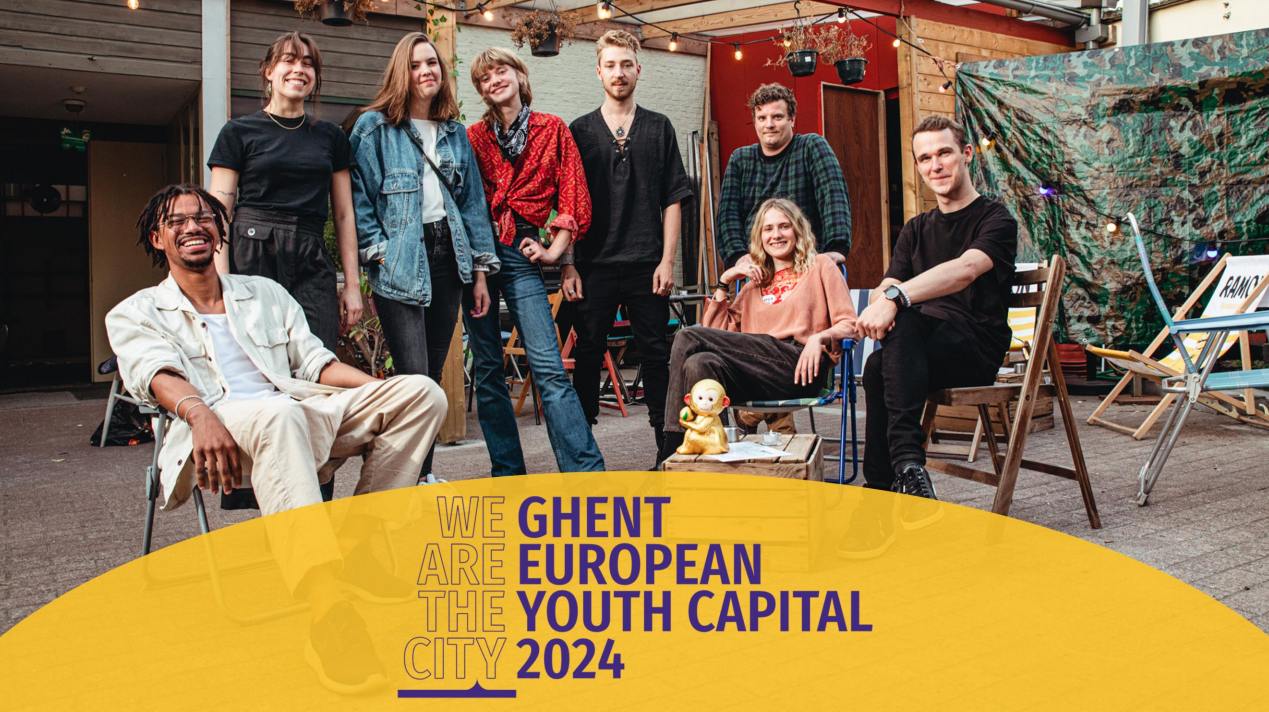
Ghent will be the European Youth Capital (EYC) in 2024. We’ve interviewed Céline de Coninck, Project Leader of Ghent EYC 2024, to tell us more.
Céline: “An EYC title brings with it the opportunity to put young people in the spotlight. It puts them on the map as a group that is to be reckoned with. It starts up a dialogue about what young people need to grow up in a city. And of the utmost importance is acknowledging the idea that young people themselves are experts on the matter of youth. So we need to use this title to give a platform to show this expertise. It’s also a chance to show what’s going well and what needs extra attention, and use these signals to participate in a European dialogue. This title doesn’t only exist for the 15- to 30-year-olds in one city. Every year again it’s a title for the whole of European youth.”
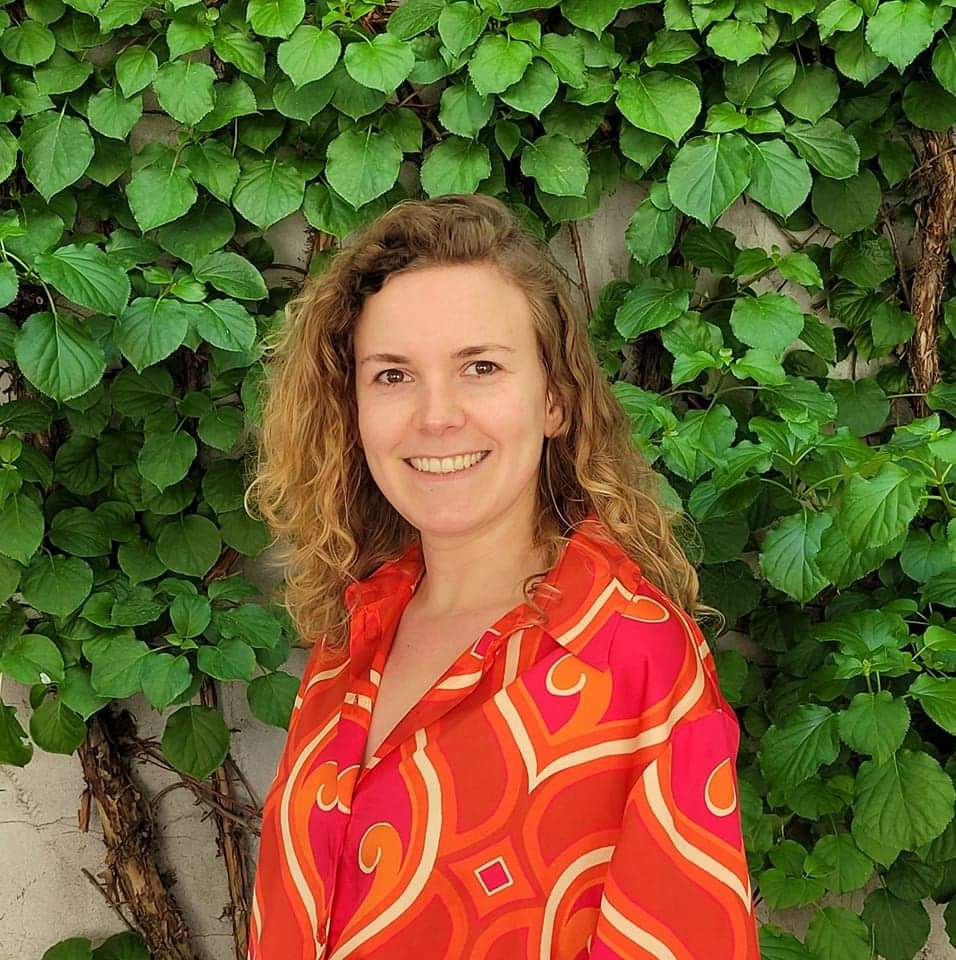
Céline: “We have quite a long tradition concerning youth participation in Ghent. We have a Youth Council in the city, which oversees the policy guidelines and checks whether young people are considered. We also try to make space from the beginning for the target group in the development of city projects concerning young people. European Youth Capital: we’re the city that celebrates this vision and takes it even further. The board of directors consists of young people between 15 to 30 years old. Politicians and policymakers connect with them to make decisions concerning the project. We strongly believe in letting young people be in control of the program and project structure. So we will build working groups in which different stakeholders can come together to work out the EYC actions.
This title is a recognition for us of the decades of youth work, work on youth participation, investment in youth infrastructure, and the vision of child- and youth-friendly cities we take very seriously here in Ghent. It’s also an opportunity to start up experiments in themes that still need work, or to bring city services from different domains closer together. It takes a city-wide effort to support civilians in the direction of Europe: whether it’s sending signals from the belly of society to policymakers or writing a project for Erasmus+. Society doesn’t evolve in the same boxes as it did a few decades ago. So we need a cross-domain approach in taking on these challenges: climate change and migration, urban culture existing on the crossing point of sports, youth, public domain, and culture, and gender in public space.”
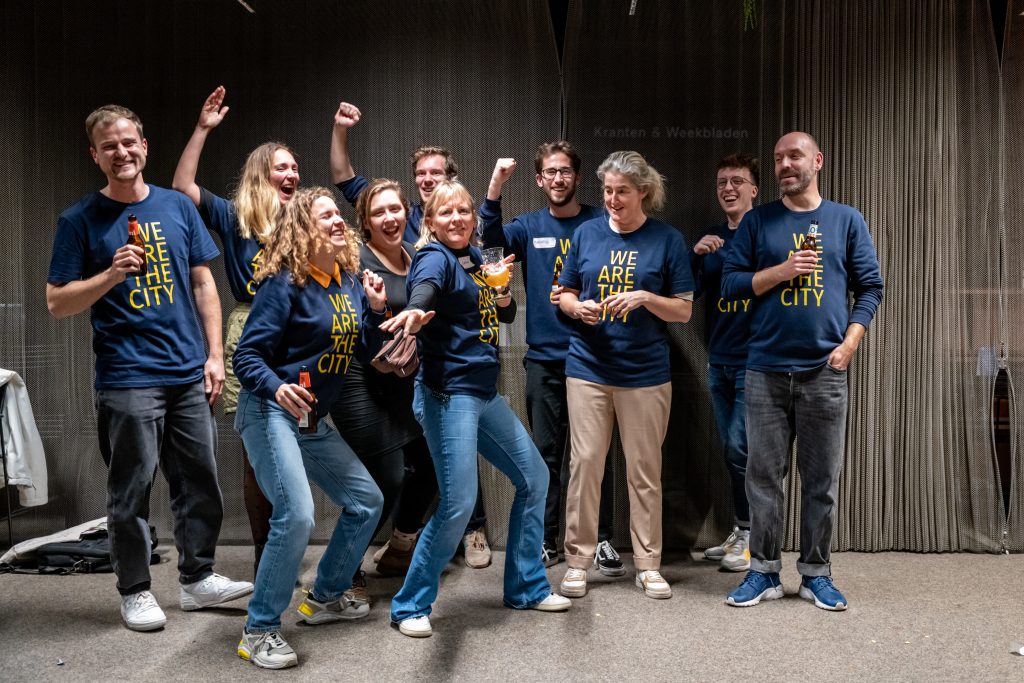
Céline: “Although the title is a city-wide effort and every service contributes its own expertise, you still need a team to bring all those actions together and make it a whole. This team is slowly growing, and we’ll be with five people before the end of the year. We will strengthen the team with a project manager who can support youth organizations and young people to Erasmus+ and other European grants, an event manager who will set up the working groups to organize events as the opening and closing, and a participation manager. The last person will focus on connecting the themes and actions with young stakeholders in the city and the Flemish region.
We’re building the website and setting up the online channels in order to support actions from organizations, individual young people, and city services. We’re building an online brand, interviewing young people to show their enthusiasm online, and connecting the dots with other cities and actors in the field. At the end of 2022, we’ll know which young people will preside on the board of directors, and this will be paired with a matchmaking and network event in the library. During this event, people can find partners and join or create a working group. We will inform organizations and inspire them with good practices of other European Youth Capitals.
The Ghent European Youth Capital creates an energy that brings people together, there’s a sense of working together on something. A lot of people working for the city already experience this feeling. But having a common goal in 2024 and beyond enhances this energy. Thinking in the means of this young target audience narrows the actions down and sets the right tone for enthusiasm. If we link this renewed energy with the enthusiasm of organizations because of the doors EYC opens, we will surely make something beautiful of Ghent European Youth Capital 2024.”
Céline: “In preparation for the current term of office, Ghent organised a major participation project “Expedition 2025“. The city organized focus groups with parents of young children, developed a participation game for schools (age 14-18), held a big survey among students and did a test case on voting from the age of 16, and 16- and 17-year-olds were asked to give their opinion on different themes. All output was submitted to the elected Deputy Majors. This was used as the basis for a new action plan, together with the new actions from the policy notes. This output formed the basis for the elaboration of the key goals for Ghent European Youth Capital 2024.
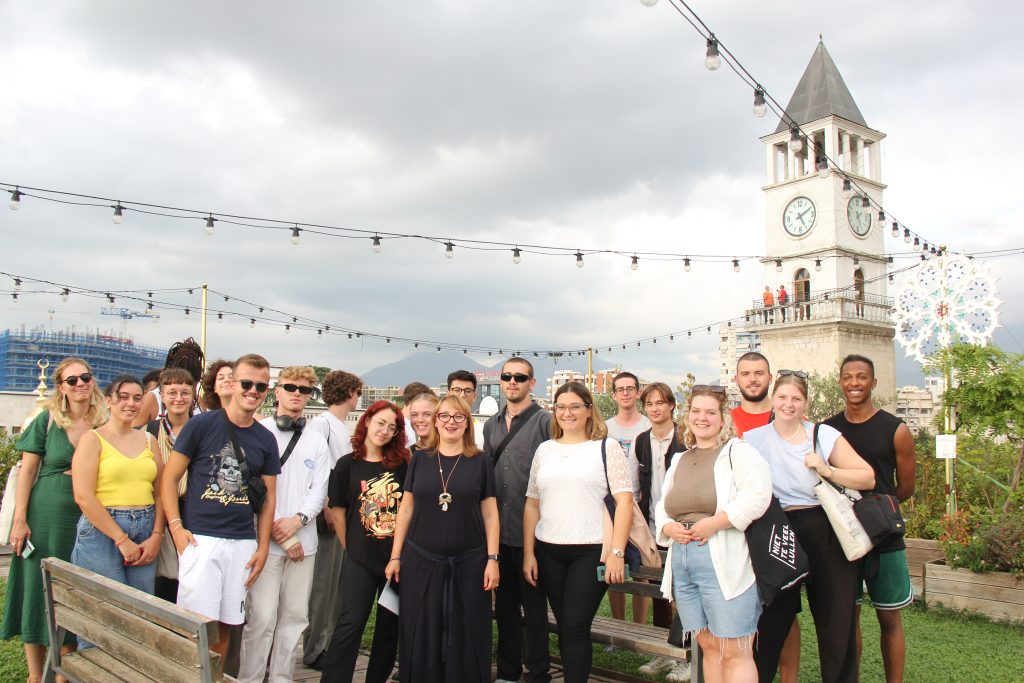
For the right understanding, we need to address that these goals are either something the city has already been focusing on, or are critical points made by young people that we should give more attention to. These goals are not just actions linked to EYC, but the city has already implemented them at this moment.
Céline: “We would like to mention a few actions here, because we think the role of the youth worker in making city policy has been strengthened throughout the years in Ghent.
For example, in January 2021 we started to support a lot more organisations through covenants. These are cooperation agreements between organisations and the city to fulfil a certain mission of the city. The focus of these new covenants lies on the support of what we call ‘self-organisations’, mobile youth welfare work and the strengthening of youth welfare work overall. Self-organisations are volunteer groups grown from communities with a migration background in Ghent who are situated in the socio-cultural sector. A lot of them work with young people, and the Youth Service has acknowledged them.
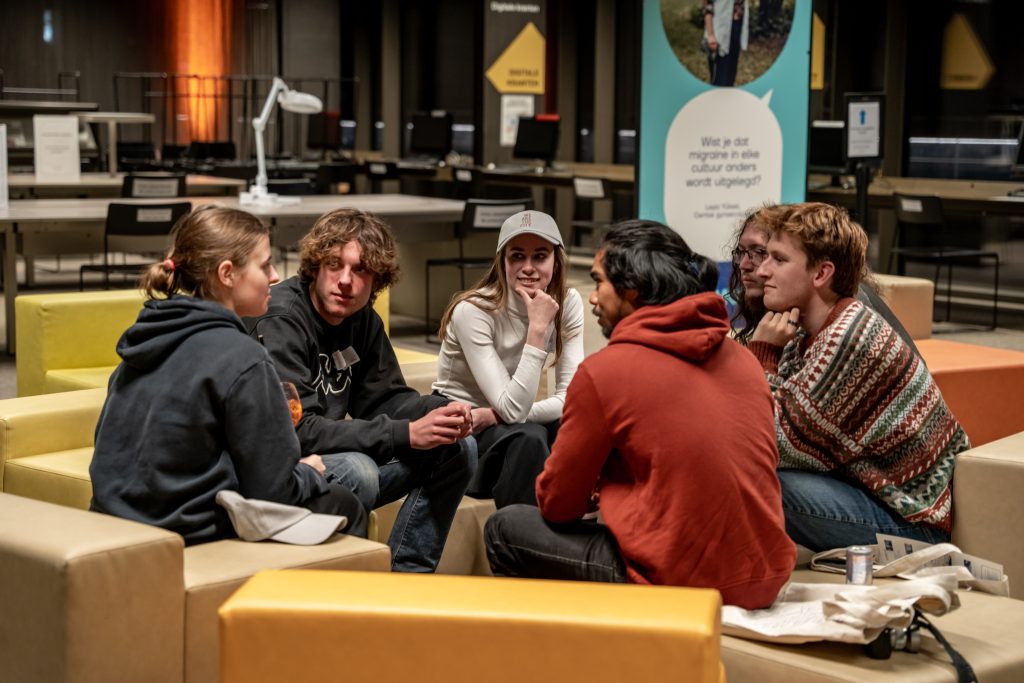
Besides that, there exists an elaborate subsidy regulation where youth organisations in Ghent can depend on. The city now supports 177 organisations on different levels. They can use the loan service of the city for free when it comes to lending out material for specific events, they can use the youth infrastructure of the city for a small price, and they can get a quite extensive subsidy to organise their activities. This is a very accessible grant and focuses on new initiatives, so there is room for people to experiment.”
There are a few rules: it has to be set up by youngsters for children and youngsters, it has to be voluntary, and their youth offer has to exist for different activities. They also have to think about methods to involve children and young people from socially vulnerable situations. These covenants are evaluated every year through a work report, where signals from a certain city area or domain are collected and communicated to policy makers. It works in two ways: their activities are being evaluated, but also the support the city service gives them is being evaluated.
Other than these yearly evaluations, youth organizations can send in their signals through the working group youth, which is organized on a neighbourhood level. Youth supporters from the youth service set them up. They function as networking and information events. Through these supporters, who you can call anytime you have a problem, youth workers can weigh in on the city policy. They are our antennas in the neighbourhoods through which we connect young people with the local government. We handle signals and problems with the organisation of workshops, network moments, brainstorming gatherings and participation processes. For example, the Forum Youth welfare Work is held four times a year. They bring together all the youth welfare organisations to learn, inform and discuss.”
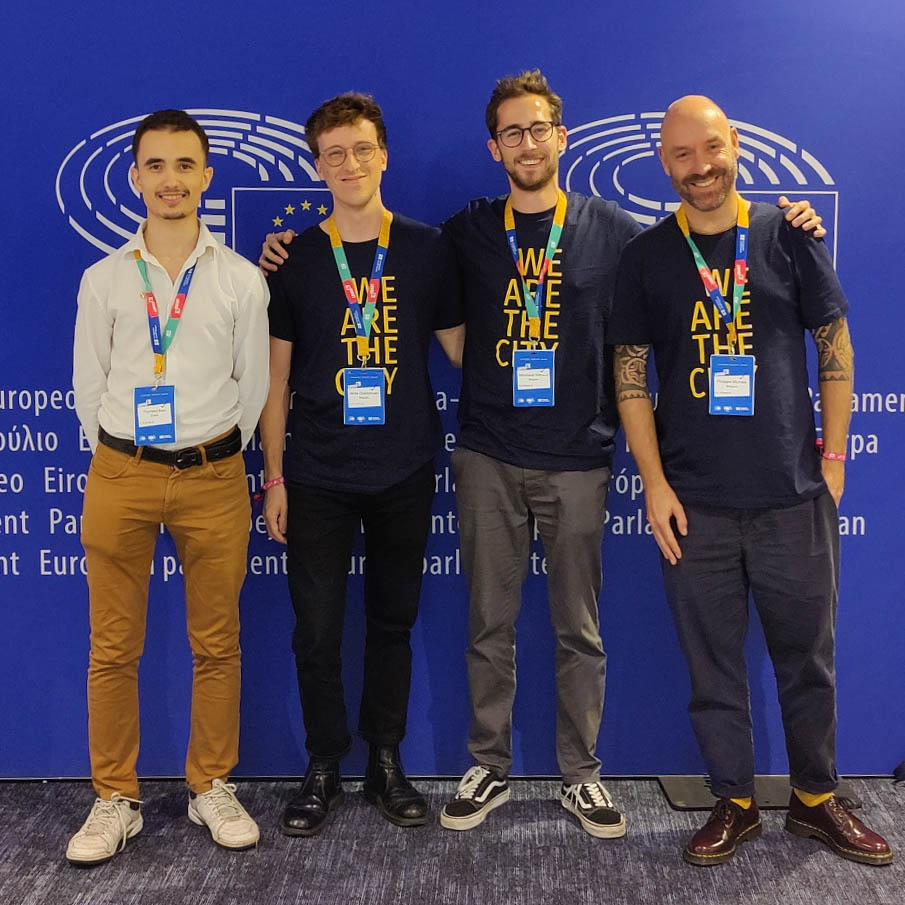
Céline: “We are a super diverse city, and we have to build the youth work offer accordingly. The idea of ‘a youth work offer for everybody’ has never been more important. The needs are bigger than the budget. This means we have the choice between repurposing the resources and finding more of them. This will be a tricky balance for the future. We need to give more ownership to youngsters who can’t find their way to the city-wide offer, who don’t know how to organise themselves. We must keep on detecting the blind spots: in which neighbourhoods is the youth work offer not sufficient, and which target groups aren’t involved in youth work?”
Céline: “The main resource is supported through Youth Service when organisations are growing professionally.
We use a range of methods and structures, such as network moments, info meetings, and youth working groups. These are gatherings on a neighbourhood level where we communicate important things. Also finding space and time to thank volunteers for the effort and energy they put into the youth work. Significant tools also come from education and workshops, some of them are for example – first aid, accountancy for non-profit organisations, non-profit organisation law and rules, advocacy for young people as well as how to connect young people with city services.”
Find more information about Ghent as the European Youth Capital in 2024 on their Instagram.